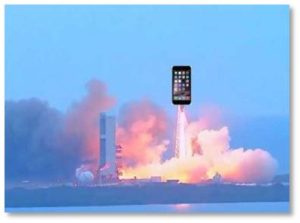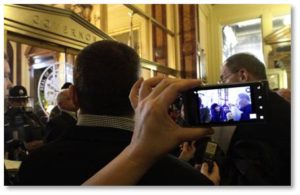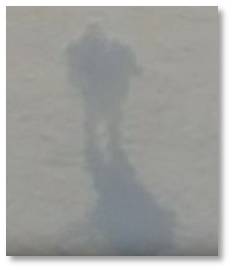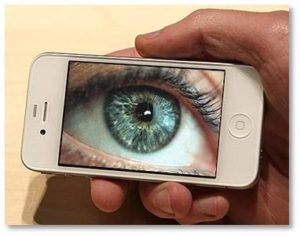Technology often changes society, sometimes in unexpected ways. I can’t help thinking, though, that Steve Jobs and his Apple Corps had no idea how much the iPhone — and the smarphones that copied it — would change the world.
Insanely Great Functionality
 True, this new product—insanely great—delivered abilities far beyond anything the market had ever seen. The iPhone contained more computing power than the machines NASA used to put men on the moon. It combined the functionality of a computer, a calculator, a camera, a video camera, and a telephone and put all that in the palm of any person’s hand. But smartphones only provided the mechanism.
True, this new product—insanely great—delivered abilities far beyond anything the market had ever seen. The iPhone contained more computing power than the machines NASA used to put men on the moon. It combined the functionality of a computer, a calculator, a camera, a video camera, and a telephone and put all that in the palm of any person’s hand. But smartphones only provided the mechanism.
Ubiquity unleashed the second part of this great change. One smartphone here and there probably would not have generated a ripple. Without the internet and social media like Facebook, LinkedIn and Twitter, those ripples probably would not have traveled far. But when everyone had a smartphone—in whatever model from whatever company—and could distribute what they recorded to the entire world instantly, it created a tipping point.
Secrets Made Public
 Smarphones changed everything. And those changes have affected everyone, sometimes for worse but mostly for better. The ripples have grown into waves that go way beyond technology, business, computers, industries or the economy. It’s harder to keep a secret these days, to spin an event according to propaganda, to cover up a mistake or an offense, to discredit something said or done, or to hold the lid on a scandal.
Smarphones changed everything. And those changes have affected everyone, sometimes for worse but mostly for better. The ripples have grown into waves that go way beyond technology, business, computers, industries or the economy. It’s harder to keep a secret these days, to spin an event according to propaganda, to cover up a mistake or an offense, to discredit something said or done, or to hold the lid on a scandal.
Now, for the first time, people can record and distribute what they see and hear. Things that used to be held secret become publicly visible, intrusive, unavoidable, astonishing. They include issues that are crucially important along with less weighty occurrences.
Seven Smarphone Reveals
- Police violence against people of color. The Blue Line holds when there’s no proof but it crumbles when multiple videos show a black man being beaten or shot without provocation.
- Street harassment. Men can now understand the impact of street harassment because they see and hear the calls, insults and threats thrown at a woman walking down the street alone. This is something that would never happen when men are present because their very presence prevents it.
- Political mendacity. A politician speaking to his “base” may say something he or she would never utter to the public at large but then have to control the damage when the speech is recorded and distributed on the Internet.
- People helping animals: Videos show ordinary folks rescuing animals in distress: men pulling a baby elephant from a hole, cutting the fishing net around a whale, saving a dog drowning in a flood, pulling a jar off a fox’s head, hauling a moose out of icy waters, and towing beached dolphins back into the sea, among many others. Just go to YouTube and you’ll find a lot of them.
No one asked these men and women to save the life of an animal—sometimes at risk to their own. They just saw something that needed to be done and pitched in because it was the right thing to do. Watching them restores our faith in the innate goodness of humanity.  Extreme Weather: When a meteorite streaks across the sky, a tornado forms, hail the size of baseballs falls, a haboob sweeps across the desert, or ice marches onto a lakeshore, people record it for everyone to see. That gives these marvels far more impact than a photo alone ever could.
Extreme Weather: When a meteorite streaks across the sky, a tornado forms, hail the size of baseballs falls, a haboob sweeps across the desert, or ice marches onto a lakeshore, people record it for everyone to see. That gives these marvels far more impact than a photo alone ever could.- Unexplained Phenomena: Sometimes things happen we cannot (yet) explain. Once, people could dismiss these as figments of imagination but now there’s hard evidence. Strange sounds come from the sky, a giant walks on clouds at 30,000 feet, lights appear in the daytime sky, and scientists don’t know why. Experts would formerly have dismissed these phenomena with a variety of “explanations” as nebulous as swamp gas but videotape is more difficult to sweep under the carpet. Photoshop? CGI? Optical illusion? Fraud? Who knows, but it’s fun to watch anyway.

- Animals Helping Animals: We also have trouble with the concept of “dumb animals” when we can actually see them helping one another without any human stimulus. One horse feeds another through stall bars, a bear pulls a drowning bird from a tank at the zoo, a troop of baboons chase a leopard from its prey, a rhinoceros lifts a zebra calf trapped in a mudhole, a water buffalo attacks a crocodile to save a baby antelope. One can’t attribute these actions to mother love or herd protection because the rescues often occur cross-species.
Smartphones and Alternate History
While instant news may have a downside, I find it mainly positive. I’m a big fan of knowledge and seeing can be believing—or at least understanding. As GI Joe says, “Now you know. And knowing is half the battle.” I also wonder, though, how history would have changed had people carried smartphones back in the day.
- We would have multiple videos of the grassy knoll in Dallas on November 22, 1963 and John Wilkes Booth leaping from the balcony after shooting President Lincoln.
- We would have moving images of whatever landed in Roswell, NM in the summer of 1947—and what climbed out.
- The press could not have kept a moratorium on pictures of Franklin Delano Roosevelt in his wheelchair or chosen to ignore John Fitzgerald Kennedy’s philandering.
- We’d know what happened to the colony at Roanoke, VA and have some idea what “Croatoan” means.
- Jack the Ripper would have been taped going into or out of Whitechapel, identified and arrested.
- We’d have videos of Lizzie Borden after the murders and know what happened to the crew of the Mary Celeste.
Big Brother is Watching
More information makes for fewer mysteries and it’s fun to speculate. In the meantime, celebrities, politicians and anyone in positions of power or authority, should smarten up real fast. Smartphones have changed society and that means we have to alter our behavior to accommodate that increased visibility.
 You can no longer say or do things that would embarrass your mother, turn off your donors, put you in jail, insult your fans, or get you fired and think that you’ll get away with it. Someone somewhere is watching and listening.
You can no longer say or do things that would embarrass your mother, turn off your donors, put you in jail, insult your fans, or get you fired and think that you’ll get away with it. Someone somewhere is watching and listening.
Forget the Washington press corps, the New York Times theater critic, the paparazzi, and 60 Minutes. People all around you are taping your actions. What you do or say, as well as what you don’t do or say, could have gone viral on social media before you brush your teeth at night.
We used to be afraid of Big Brother as totalitarian government. But perhaps, just maybe, Big Brother is now us, with smartphones..
